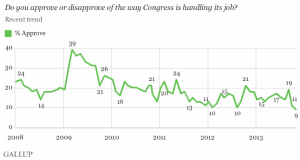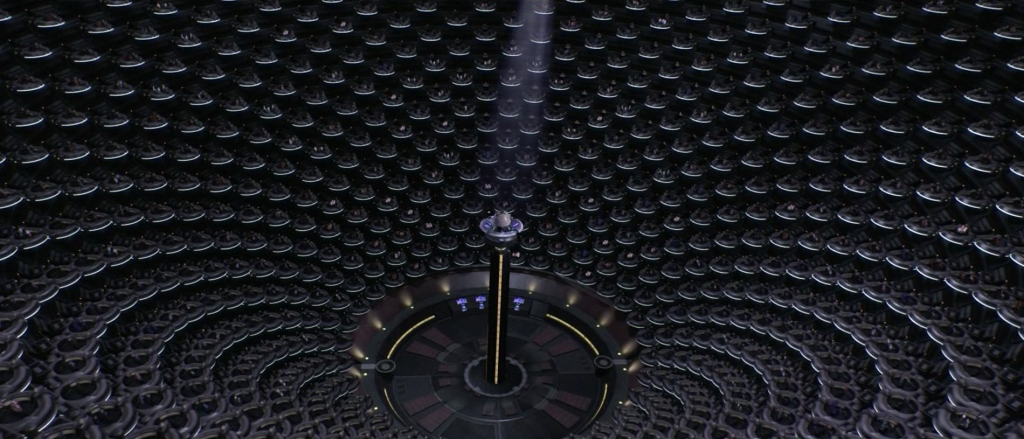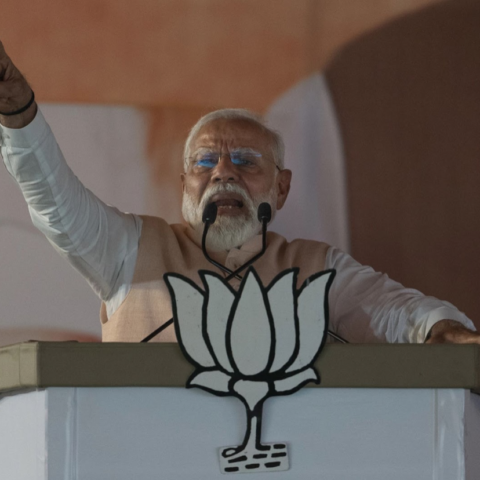Recently I had the opportunity to interview Anthony Madonna, a professor of political science at the University of Georgia, on the topic of Star Wars and politics. Due to the extensive nature of the interview, I broke it into three parts, mirroring the original Star Wars Trilogy.
Star Wars Interview Part 1: A New Hope for Political Engagement
When asked about his broad outlook on the politics of Star Wars, Madonna stated, “Politics is not treated in a favorable light… if you see the first few movies …how the Jedi intentionally avoided engaging the political process early on…was part of the sell. I often worry that the way we portray politics in movies like this perpetuates the notion that students…should not engage the political process. I think that’s definitely problematic.”
Around the time Lucas was writing Star Wars in the early 1970s Americans were already becoming disillusioned with politics thanks to Nixon’s infamous Watergate scandal. Following the release of the first Star Wars movie in 1981, then President Reagan continued to bring scandal to the White House with the Iran-Contra affair, secretly selling weapons to Iran. And who could forget about President Clinton not having any relations with that woman?
So  are these political examples the reason for the trend of political villains? Perhaps people enjoy watching bad politicians because we’re so disillusioned with real world politics. We see examples of cynicism in America everywhere- from the 36.4 percent voter turnout rate to the 13 percent Congress Approval rating. Does cynicism in Hollywood lead discourage political engagement or does the skepticism in voters create these themes in Hollywood? Either way it’s a problem that needs to be addressed as America’s great experiment in democracy is starting to falter.
are these political examples the reason for the trend of political villains? Perhaps people enjoy watching bad politicians because we’re so disillusioned with real world politics. We see examples of cynicism in America everywhere- from the 36.4 percent voter turnout rate to the 13 percent Congress Approval rating. Does cynicism in Hollywood lead discourage political engagement or does the skepticism in voters create these themes in Hollywood? Either way it’s a problem that needs to be addressed as America’s great experiment in democracy is starting to falter.
Star Wars Interview Part 2: Social Issues Strike Back
Are social issues often the source of contention in an authoritarian regime? Are sub-governments able to form, perhaps to relieve some of this pressure? Or are there other methods?
Madonna stated that, despite the fact that they shy away from politics, under the Jedi “certainly the people would be better off.” When asked for the source of the Rebel’s contention Madonna points to the central government, who was “taking a lot of resources and spending…on mechanisms that were controlling the people by force…and not necessarily spending those resources on things that improved the lives of those people.”
Perhaps the Empires’ biggest mistake was the lack of focus on social issues that real authoritarian regimes use to gain legitimacy. One example lies in China, which has been reforming its welfare system since 2000 to be more inclusive to the often-marginalized rural population. Contrastingly, North Korea, claims to be spending almost 40 percent on social features (education, health care, etc) however it is more likely they spend 30-50 percent of their budget on the military and little to no money on social welfare programs. In other examples, look at Vargas in Brazil and Peron in Argentina: both authoritarian leaders whose populism and commitment to social values helped them retain legitimacy and power in the 1900s.
However, desperate authoritarian regimes still use fear and intimidation more to grasp onto power. Although no government is willing to put resources (as in, $15.6 septillion) into building that Death Star.
https://twitter.com/DepressedDarth/status/593497664974643200
Unfortunately, more authoritarian governments are willing to utilize violent force to suppress uprisings, from Egypt and its attack on student protests to Putin’s crackdown on freedom of expression in Russia.
I asked Madonna if it’s possible for a sub-government such as the Ewok tribe to form under such large empires. He responded: “What I would guess is that this is very much still a centralized government. There’s going to be a sub-government there but any point the Empire is going to take over that sub-government if they’re disagreeing with them. It’s not a federal system in the classical sense. It’s still a top-down hierarchical system, where I think the Empire could care less what you’re doing as long as it’s not running contrary to their interests.”
We also see the allowance of sub-governments in more legitimate authoritarian regimes. Terribly boring studies have shown that political subsystems can increase political viability and are integral parts of the policy-making process. Take Afghanistan for example: historically the government allowed tribal governments to have more local autonomy while attempts to centralize local governance has failed.
Some authoritarian regimes appear to be taking Star War’s cue that when social issues are neglected, the people and non-humans (we can’t forget the Genosians) alike are likely to rise up. Just because there’s no real-life Darth Vader does not mean that there are governments not using ‘the force’ of totalitarian regimes and authoritarian strong holding.
Star Wars Interview Part 3: Return of the Power Grabbing in Politics
 Madonna argues that in Star Wars the Jedi was less effective because they were “willing to delegate that [power] to the Republic… they did not get involved in the government to stop the concentrating of power, and it seemed like they knew [Palpatine] probably shouldn’t have that much power, up front. They didn’t do anything about it.” Palpatine’s grasp of power was actually somewhat legitimate because he “sort of went through and took power through the Galactic Senate.”
Madonna argues that in Star Wars the Jedi was less effective because they were “willing to delegate that [power] to the Republic… they did not get involved in the government to stop the concentrating of power, and it seemed like they knew [Palpatine] probably shouldn’t have that much power, up front. They didn’t do anything about it.” Palpatine’s grasp of power was actually somewhat legitimate because he “sort of went through and took power through the Galactic Senate.”
Why did this happen? The power was originally delegated in the Star Wars context because “a trade federation had issued a blockade against Naboo.” Madonna argues then that the Jedi’s were too hesitant to engage in the political process to really do anything about it: “I think the critique is that they could have stopped that power grab, by going through the Senate if they wanted to, by tipping off the Senators if they wanted to, and just raising some awareness.” Following that we get the unintended consequences of a Senator turned Chancellor turned dictator.
Ok, but this is all a science fiction opera – why would this political nonsense matter? Because this ascent to power is also reflected in the real world. After all, Hitler rose to power in a very similar sense – he was legitimately elected as chancellor with 33 percent of the vote (higher than any other party in the election).
In the U.S. context it ranges from bureaucratic delegation to a concentration of Presidential power. As Madonna explained, “Congress does this frequently, where they’ll create a board to decide whether or not they’ll close military bases, or, in the instance of the Affordable Care Act…whether or not employers had to provide birth control under the act and whether or not there could be a religious exemption.” The F.D.A. actually made that politically charged decision – not elected officials.
Madonna claims this concept also “parallels really nicely” with the autonomous presidency. Lately there has been contention from Republicans against Obama’s unilateral action on immigration reform, arguing he’s abusing his power. Historically we have seen numerous Presidents on both sides of the aisle, however, issuing large numbers of executive orders.
Finally an example of runaway power is evident between citizen-governmental relations. The kind we may not even know about: government surveillance. Post 9/11 we gave up certain powers of freedom to our government via the Patriot Act in return for increased security. But did we give these freedoms up realizing that we may not get them back? In a time of crisis we let the US government do what it had to do and now we are seeing the unintended consequences of that with increased surveillance and serious infringements on citizen privacy, particularly in phone records.
Despite all these examples, why are governments (and citizens) giving up reserved powers? Well, Madonna explains that in the United States its still relatively safe thanks to “the extreme separation of power system…It’s unlikely you’re ever going to see that sort of concentration.” He stated “Fast action is a benefit. The downside is that, once you give them those powers, it may be difficult to get those powers back.”
Madonna makes the “path dependency point” that “once you decide to enter into a decision… [its] very difficult to exit from that path.” We see it in Star Wars when Palpatine legitimately takes command but then never gives it back and we see it in the real world, when government agencies or officials are delegated authority that is never truly returned.
Governments should take a cue from Hollywood. The lack of faith in fake governments reflects the lack of faith in the United States’ very real democratic government. Authoritarian regimes without concern for social issues tend to lack the legitimacy needed to retain power. And finally, while we may need to occasionally let people (or Galactic Chancellors) have temporary powers, we also must be prepared for the unintended consequences and realize that these powers may never be returned.
– By Rory Hibbler



